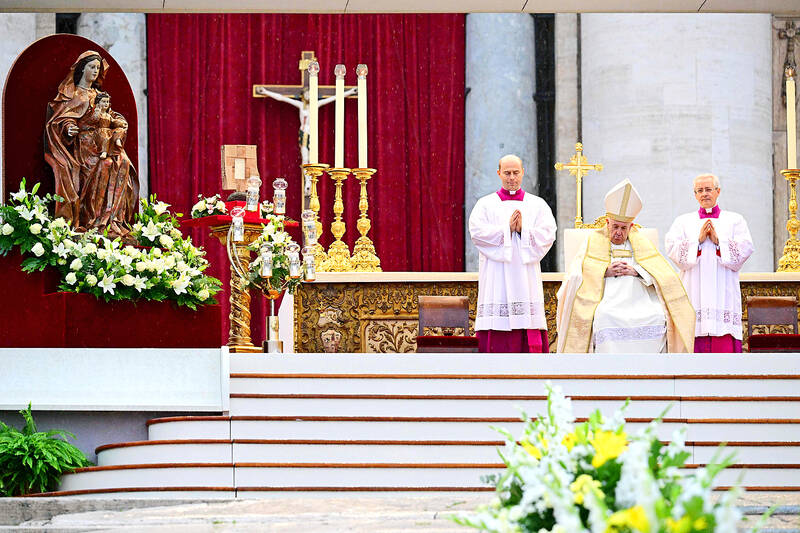Thousands of people yesterday gathered in St Peter’s Square as Pope Francis presided over the beatification of John Paul I, the so-called “Smiling Pope” who led the Catholic Church for just 33 days before dying in contested circumstances.
John Paul I, the son of a bricklayer from the Dolomite Mountains and a particularly warm and pastoral figure, was elected pope on Aug. 26, 1978, at the age of 65.
He died just 33 days later, on Sept. 28, 1978, of a heart attack, making him the shortest-serving pontiff in modern church history.

Photo: AFP
His death sparked intense speculation as to the cause, from suicide — he seemed reluctant to take on the position of pope — to murder, allegedly by those who opposed his plans to reform the church, particularly the powerful Vatican bank.
Many have since discounted this, and biographer Christophe Henning said the swirling rumors can be explained by the sudden nature of his death and the “calamitous communication” by the Vatican at the time.
No autopsy was conducted to determine the cause of death, and the Vatican issued inconsistent and false information about what happened.
For example, his lifeless body — sitting in bed, his reading glasses on his nose and typewritten documents in his hand — was found by a nun.
However, the Vatican did not want to acknowledge the presence of a woman in his bedroom, so said his secretary found him.
“For me it does not seem that there is really a doubt” about his death by natural causes, particularly given “we know that he was in fragile health,” Henning said.
The Vatican announced in October last year that it had recognized a miracle attributed to John Paul I, allowing him to become beatified, a process when a person becomes “blessed” and the final step before becoming a saint.
The miracle was the sudden healing of a gravely ill 11-year-old girl in Buenos Aires in 2011, after a local priest prayed to the late pontiff.
Under the rules of the Catholic Church, in most cases a second miracle needs to be recognized before someone can be made a saint.
Born on Oct. 17, 1912, in the northern Italian town of Canale d’Agordo, John Paul I rose to become patriarch of Venice, cardinal and then head of the Catholic Church.
The last Italian pope, he was seen as a man of consensus, of humility and simplicity, with a strong sense of pastoral duty.
“Open to dialogue and listening, he gave priority to pastoral visits and direct contact with the faithful,” the Vatican said in a beatification brochure.
He defended the church’s opposition to abortion and contraception, while also seeking to reform its governance.
Sister Margherita Marin, who helped John Paul I in the papal apartments, said he was “friendly to everyone.”
“He knew how to treat his colleagues with a lot of respect,” she told a Vatican news conference on Friday.
Among the most recent popes, John XXIII (1958-1963), Paul VI (1963-1978) and John Paul II (1978-2005) were proclaimed saints.

Kehinde Sanni spends his days smoothing out dents and repainting scratched bumpers in a modest autobody shop in Lagos. He has never left Nigeria, yet he speaks glowingly of Burkina Faso military leader Ibrahim Traore. “Nigeria needs someone like Ibrahim Traore of Burkina Faso. He is doing well for his country,” Sanni said. His admiration is shaped by a steady stream of viral videos, memes and social media posts — many misleading or outright false — portraying Traore as a fearless reformer who defied Western powers and reclaimed his country’s dignity. The Burkinabe strongman swept into power following a coup in September 2022

TRUMP EFFECT: The win capped one of the most dramatic turnarounds in Canadian political history after the Conservatives had led the Liberals by more than 20 points Canadian Prime Minister Mark Carney yesterday pledged to win US President Donald Trump’s trade war after winning Canada’s election and leading his Liberal Party to another term in power. Following a campaign dominated by Trump’s tariffs and annexation threats, Carney promised to chart “a new path forward” in a world “fundamentally changed” by a US that is newly hostile to free trade. “We are over the shock of the American betrayal, but we should never forget the lessons,” said Carney, who led the central banks of Canada and the UK before entering politics earlier this year. “We will win this trade war and

‘FRAGMENTING’: British politics have for a long time been dominated by the Labor Party and the Tories, but polls suggest that Reform now poses a significant challenge Hard-right upstarts Reform UK snatched a parliamentary seat from British Prime Minister Keir Starmer’s Labor Party yesterday in local elections that dealt a blow to the UK’s two establishment parties. Reform, led by anti-immigrant firebrand Nigel Farage, won the by-election in Runcorn and Helsby in northwest England by just six votes, as it picked up gains in other localities, including one mayoralty. The group’s strong showing continues momentum it built up at last year’s general election and appears to confirm a trend that the UK is entering an era of multi-party politics. “For the movement, for the party it’s a very, very big

The Philippines yesterday slammed an “irresponsible” Chinese state media report claiming a disputed reef in the South China Sea was under Beijing’s control, saying the “status quo” was unchanged. Tiexian Reef (鐵線礁), also known as Sandy Cay Reef, lies near Thitu Island, or Pagasa, where the Philippines stations troops and maintains a coast guard monitoring base. Chinese state broadcaster CCTV on Saturday said that the China Coast Guard had “implemented maritime control” over Tiexian Reef in the middle of this month. The Philippines and China have been engaged in months of confrontations over the South China Sea, which Beijing claims nearly in its